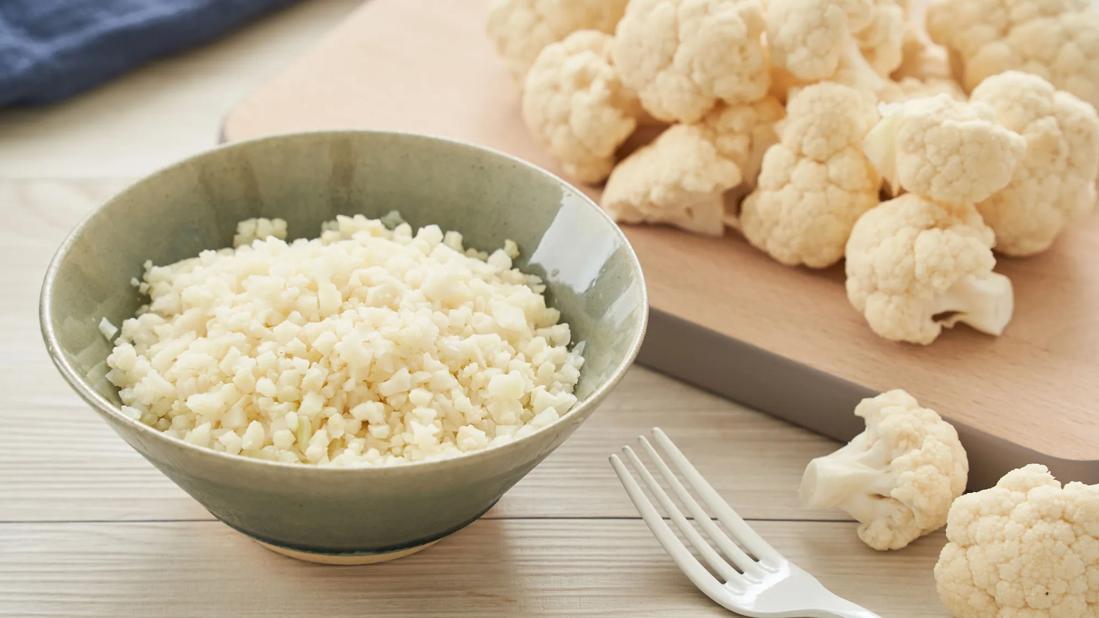High in antioxidants and vitamins B9, C and K, cauliflower helps fight illness, strengthens bones, and protects your liver and gut

Image content: This image is available to view online.
View image online (https://assets.clevelandclinic.org/transform/047ea154-dc47-4359-8e21-3a7cba5e1fb7/cauliflower-rice-1974362807)
Riced cauliflower in a bowl, with cauliflower florets on cutting board
Cauliflower may not have the bright color of carrots or the bold flavor of onions, but don’t pass it by in the produce aisle.
Advertisement
Cleveland Clinic is a non-profit academic medical center. Advertising on our site helps support our mission. We do not endorse non-Cleveland Clinic products or services. Policy
“Cauliflower is low in calories and sodium, but packed with nutrients like vitamins C and K,” says registered dietitian Julia Zumpano, RD, LD. “It’s also a good source of folate, which helps support healthy cell growth during pregnancy.”
As Zumpano explains, there are many reasons to enjoy this underrated vegetable.
Cauliflower is a cruciferous vegetable, like broccoli and cabbage. It’s actually a flowering plant that we harvest before it has blooms. What we eat are the undeveloped florets — called curds — because they look a bit like cheese curds.
The plant’s long green leaves protect its head from sunlight, which keeps the cauliflower white and mild in flavor. If it’s exposed to too much sun, it can turn yellow or brown and taste bitter. Green cauliflower is a natural hybrid (cross) between cauliflower and broccoli.
Absolutely. Cauliflower is packed with nutrients, antioxidants and fiber. A cup of raw, chopped cauliflower has approximately:
Cauliflower also provides these nutrients:
Advertisement
Zumpano shares the many health benefits of cauliflower.
Cauliflower is a great source of choline — a nutrient many of us don’t get enough of. Your body needs choline to move fat out of your liver and keep it healthy. It also supports memory, mood and muscle control. “While serious problems from choline deficiency are rare, we should all aim to get more of this important nutrient,” says Zumpano.
Choline is also important for:
Cauliflower has fiber and antioxidants that help keep your gut happy. Antioxidants like sulforaphane and glucosinolates ease inflammation, while the fiber supports regular bowel movements.
“Most of us need to get more fiber from foods,” says Zumpano. “Eating more cauliflower can help.”
Cauliflower is a good source of folate, also called vitamin B9. It’s especially important during pregnancy to support healthy brain and spinal cord development. “Folate lowers the risk of a baby having neural tube defects that affect the brain and spinal cord,” notes Zumpano.
Folate is also essential for making red blood cells, which carry oxygen throughout your body.
One cup of cauliflower provides more than half of your daily vitamin C — a key nutrient that helps your immune system fight off germs.
Your body also needs vitamin C to:
Vitamin K helps your body build proteins that keep bones strong and blood clotting properly. Cauliflower offers a good boost, and research shows that getting enough vitamin K may moderately lower your risk of bone fractures and osteoporosis.
There’s no question that cauliflower is a nutritious food. But it can cause unwanted side effects in some people.
Like other cruciferous vegetables, cauliflower can cause bloating and gas. That’s because it contains fiber and sulfur-based compounds that can ferment in your gut.
“It’s harder for your digestive system to break down the complex fibers in cruciferous vegetables,” explains Zumpano.
Although rare, some people are allergic to certain proteins (cruciferin and napin) found in cauliflower and other cruciferous vegetables. This food allergy can cause mild to severe symptoms, including hives, stomach upset, and sneezing and wheezing. In extreme cases, the allergy can cause life-threatening anaphylaxis.
Raw cauliflower provides the most antioxidants. But cooked cauliflower is easier to digest and less likely to upset your stomach. Steaming cauliflower is one way to keep most of the veggie’s antioxidants while cutting down on its gas-inducing properties.
Advertisement
Cauliflower has become a vegetable superstar among those who follow low-carbohydrate meal plans, like the keto diet. That’s because cauliflower makes a decent stand-in for higher carbohydrate foods. Try:
You can also season and cook thick slices of cauliflower steak. “Cauliflower is versatile,” says Zumpano. “It readily absorbs the flavors of whatever you cook it with.”
Advertisement

Sign up for our Health Essentials emails for expert guidance on nutrition, fitness, sleep, skin care and more.
Learn more about our editorial process.
Advertisement
Pick bell peppers to help fight cancer, memory decline and joint pain
The tropical fruit is a good source of antioxidants and vitamin C
High amounts of cholesterol and saturated fat in red meat may be linked to heart disease
The leaves and pods from this tree are rich in essential nutrients
This starchy root vegetable is a staple in many global cuisines — but it has to be prepared correctly, or it can cause serious concerns
These delicate green sprouts can give you an extra dose of vitamin K and other nutrients — but they’re not safe for everyone
Edamame, lentils and chicken breast are good sources of protein
Eating this root vegetable can help support your eye, heart and brain health
Although it could be used as a moisturizer, this new trend is not recommended
Communicating clear limits helps protect your time, energy and emotional well-being
High cholesterol can be genetic, but testing and treatment can lower your heart disease risk